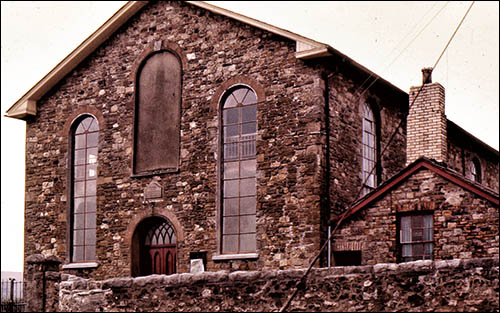Poet Myfyr Wyn’s memorial, Tredegar
Myfyr Wyn’s statue stands at the site of Sirhowy ironworks, where he worked as a young blacksmith. It’s believed that he sometimes wrote verses on the sides of trams (basic railway wagons) so that colleagues could enjoy them as the trams moved around the industrial complex.
William Williams – bardic name ‘Myfyr Wyn’ – was born in 1849 at Twyn Star, Tredegar, to John and Hannah Williams. John hailed from Ceredigion and died in an accident at Bryn Bach pit, Tredegar, when William was a child labourer at his side. He was part of the mass movement of labour from poor rural areas to the fast-growing heavy industries of South Wales. The family attended Carmel Baptist chapel in Dukestown, pictured in 1976. Chapel minister Robert Ellis (‘Cynddelw’) taught young William the basics of poetry.
 At the ironworks, blacksmith Joseph Bevan (‘Gwentydd’) was a mentor to William and to another poet, Ezekiel Davies (‘Gwentwyson’). Joseph was known as ‘yr hen Fyfyr’ (the old pensive poet). The younger poets argued over who should inherit the ‘myfyr’ title; the matter was settled when William beat Ezekiel in an eisteddfod.
At the ironworks, blacksmith Joseph Bevan (‘Gwentydd’) was a mentor to William and to another poet, Ezekiel Davies (‘Gwentwyson’). Joseph was known as ‘yr hen Fyfyr’ (the old pensive poet). The younger poets argued over who should inherit the ‘myfyr’ title; the matter was settled when William beat Ezekiel in an eisteddfod.
William proved his skill with long poems in both strict and free metre, but specialised in short and often witty poems. To the disapproval of some poets, he sometimes included local words or phrases of the Monmouthshire valleys, giving us a useful record of how Welsh was spoken here before communities and workplaces became predominantly English-speaking. His book Atgofion am Sirhywi a’r Cylch contains recollections of the Tredegar area in his time.
He was said to respect all people, regardless of their class or status. This is his englyn to people in one of the lowliest positions in society:
Y Carpiwr
Â’i oer swn y carpiwr sydd—yn rhoi bloedd
Ar blant fel cad-lywydd;
Gwneyd masnach â’r rhai bach bydd
Er elw ar heolydd.
In rough translation:
The Ragman
With his cold sound, the ragman gives a shout
To the children like a General;
He will trade with the little ones
For profit on roads.
Myfyr Wyn spent his later decades in Porth and Aberdare and was known by many as ‘Y Bachan Ifanc’ (the young boy), his pseudonym in the newspaper Tarian y Gweithiwr. He died near Aberdare in 1900, leaving his wife Mary Ann and blind teenage son Edgar.
With thanks to Blaenau Gwent County Borough Council and to Tredegar Community Archive for the chapel photo. Sources include the National Library of Wales
Postcode: NP22 4QP View Location Map
Tredegar Community Archive website



